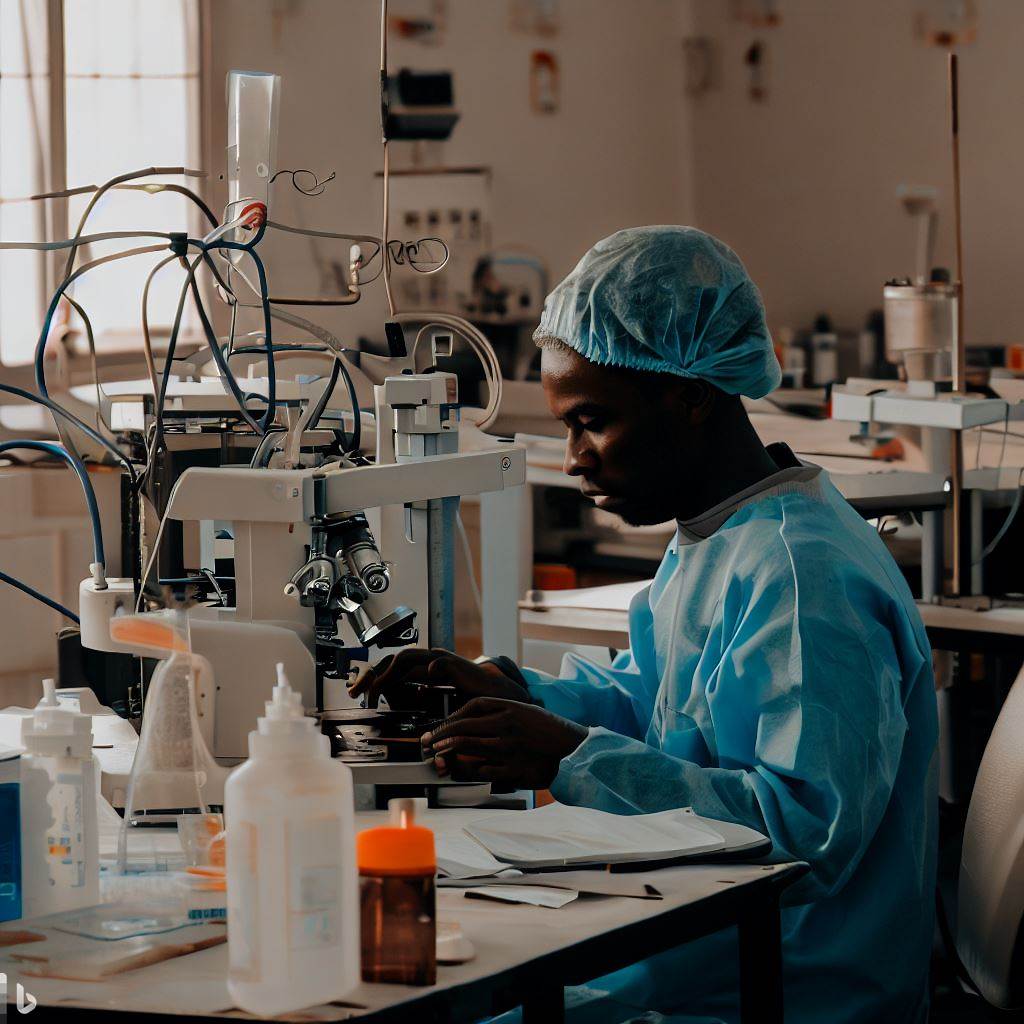Introduction
A biomedical engineer designs and develops medical equipment and technology for healthcare purposes.
They are crucial in the healthcare industry as they improve patient care and diagnose and treat diseases.
In Nigeria, a typical day for a biomedical engineer involves a variety of tasks and responsibilities.
Morning Routine
In the morning, a Nigerian biomedical engineer starts their day by reviewing and analyzing patient data.
They collaborate with healthcare professionals to understand specific medical needs and create innovative solutions.
They also participate in team meetings to discuss ongoing projects and provide updates.
Design and Development
Throughout the day, a biomedical engineer in Nigeria focuses on designing and developing medical devices.
They use computer software and technology to create prototypes and conduct experiments for testing.
They also ensure that the devices meet safety regulations and quality standards.
Equipment Maintenance
A significant part of a biomedical engineer’s day involves the maintenance and repair of medical equipment.
They inspect and troubleshoot devices to ensure their proper functioning.
They conduct routine check-ups and calibrations to keep the equipment in optimal condition.
Training and Education
Nigerian biomedical engineers also conduct training sessions for healthcare professionals on how to use and maintain medical equipment.
They stay updated with the latest advancements in biomedical engineering through conferences and workshops.
Collaboration and Support
Throughout the day, biomedical engineers collaborate with other healthcare professionals, including doctors, nurses, and technicians.
They provide technical support and address any issues related to medical equipment.
Lastly, biomedical engineers play a vital role in the healthcare industry in Nigeria.
Their work involves designing and developing medical devices, maintaining equipment, and providing support to healthcare professionals.
The continuous efforts of biomedical engineers contribute to the improvement of healthcare and the well-being of patients in Nigeria.
Education
As a Nigerian biomedical engineer, I hold a required educational background and qualifications.
Required Educational Background and Qualifications
To become a biomedical engineer in Nigeria, one must possess a bachelor’s degree in biomedical engineering or a related field.
The minimum educational requirement is a four-year undergraduate program.
In addition to the bachelor’s degree, some employers may prefer or require a master’s degree in biomedical engineering.
Overview of Biomedical Engineering Programs in Nigeria
Nigeria offers several universities and institutions that provide biomedical engineering programs.
- University of Lagos: Offers a bachelor’s degree in Biomedical Engineering.
- University of Nigeria, Nsukka: Provides a biomedical engineering program at both undergraduate and postgraduate levels.
- Obafemi Awolowo University: Offers a bachelor’s degree in Biomedical Engineering.
- University of Ibadan: Provides a bachelor’s degree in Biomedical Engineering.
These programs equip students with the necessary knowledge and skills required in the field.
Importance of Continuous Learning in the Field
Continuous learning is crucial for biomedical engineers in Nigeria to stay updated with emerging technologies and advancements.
Biomedical engineering is a rapidly evolving field with new research and innovations occurring regularly.
Attending conferences, workshops, and seminars allow engineers to exchange knowledge and collaborate with industry experts.
Continuous learning ensures that biomedical engineers in Nigeria can provide the best possible solutions to healthcare challenges.
In general, to become a Nigerian biomedical engineer, one must attain the required educational background and qualifications.
Nigeria offers various biomedical engineering programs, and continuous learning is essential to stay updated in the field.
By pursuing education and embracing continuous learning, biomedical engineers can contribute to the improvement of healthcare in Nigeria.
Work Environment
Biomedical engineers in Nigeria have the opportunity to work in various settings, each with its own unique challenges and demands.
Different settings where biomedical engineers can work:
- Hospitals
- Research institutions
- Pharmaceutical companies
- Medical equipment manufacturers
- Government organizations
Working in hospitals, biomedical engineers play a vital role in ensuring the smooth operation of medical equipment and devices.
At research institutions, these engineers contribute to groundbreaking research and development of new medical technologies.
In pharmaceutical companies, they are involved in designing and improving drug delivery systems.
Biomedical engineers working for medical equipment manufacturers are responsible for designing and testing innovative medical devices.
Government organizations often employ biomedical engineers to provide technical expertise and regulatory support.
Common challenges faced by Nigerian biomedical engineers:
- Limited funding for research and development
- Inadequate infrastructure and resources
- Lack of awareness about biomedical engineering
- Difficulty in accessing advanced training and education
- High competition for job opportunities
The lack of sufficient funding for research and development poses a significant challenge to Nigerian biomedical engineers.
Inadequate infrastructure and resources hinder their ability to conduct experiments and implement innovative solutions.
There is a need for increased awareness about biomedical engineering among the general public and policymakers.
Accessing advanced training and education can be challenging due to limited opportunities and financial constraints.
With a high number of biomedical engineering graduates and limited job opportunities, the competition for employment is intense.
Importance of teamwork and collaboration:
Biomedical engineers in Nigeria understand the value of teamwork and collaboration in their work environment.
Collaboration with doctors, nurses, and other healthcare professionals is crucial for developing effective medical solutions.
By working together, biomedical engineers and healthcare professionals can address complex medical challenges more efficiently.
Teamwork also facilitates the exchange of ideas, knowledge sharing, and continuous improvement in patient care.
Additionally, collaboration with researchers and industry experts allows for innovation and the development of cutting-edge technologies.
Biomedical engineers in Nigeria recognize that success in their field relies on effective teamwork and collaboration in a multidisciplinary environment.
All in all, Nigerian biomedical engineers work in diverse settings, facing challenges related to funding, infrastructure, and competition.
However, they emphasize the importance of teamwork and collaboration to overcome these challenges and drive innovation in healthcare.

Daily Tasks
Typical tasks performed by a Nigerian biomedical engineer
- Conducting research on medical devices and equipment to identify potential design improvements.
- Collaborating with medical professionals to understand their needs and provide technical support.
- Designing and building prototypes of new medical devices for testing and evaluation purposes.
- Installing, calibrating, and maintaining medical equipment, ensuring proper functioning and accuracy.
- Troubleshooting and repairing malfunctioning medical devices to minimize downtime in healthcare facilities.
- Conducting safety and performance tests to ensure compliance with quality standards and regulations.
- Training medical staff on the proper use and maintenance of biomedical equipment.
- Documenting all activities, including equipment modifications, repairs, and test results, for future reference.
- Staying updated with advancements in biomedical engineering through continuous learning and professional development.
- Collaborating with other engineers and interdisciplinary teams to develop innovative solutions to healthcare challenges.
Examples of equipment and devices they work with
- X-ray machines – used for diagnosing and monitoring various medical conditions.
- Electrocardiogram (ECG) machines – used to measure and record the electrical activity of the heart.
- Ultrasound machines – used for imaging internal organs and monitoring pregnancies.
- Ventilators – used to support patients’ breathing when they are unable to do so on their own.
- Prosthetic limbs – designed and customized to restore functionality for individuals with limb loss.
- Dialysis machines – used to filter and purify blood for patients with kidney failure.
- Rehabilitation devices – such as robotic exoskeletons, to assist individuals in regaining mobility.
Emphasis on problem-solving and critical thinking skills
Biomedical engineers in Nigeria heavily rely on their problem-solving and critical thinking skills.
They analyze complex medical challenges and develop innovative solutions to improve healthcare outcomes.
By utilizing their technical expertise and understanding of biology and medical science, they address various issues.
These include designing more efficient devices, ensuring equipment safety, and enhancing patient care.
Effective problem-solving also involves considering the economic and cultural context of healthcare in Nigeria.
Engineers must work within existing resources and constraints to maximize impact and accessibility of technologies.
Continuous learning and collaboration with healthcare professionals are essential for successful problem-solving.
Biomedical engineers play a crucial role in advancing medical technology and transforming healthcare in Nigeria.
They contribute to enhancing the quality of care, addressing healthcare disparities, and improving patient outcomes.
Most importantly, the daily tasks of Nigerian biomedical engineers involve a wide range of responsibilities.
From research and design to installation and maintenance, they contribute to the development and improvement of medical devices.
With their problem-solving and critical thinking skills, they navigate challenges and drive innovation in the healthcare sector.
Read: A Guide for Biomedical Engineer: Job Prospects in Nigeria
Interactions and Collaborations
In the life of a Nigerian biomedical engineer, interactions and collaborations are indispensable.
Working within healthcare demands constant engagement with fellow professionals, such as doctors and nurses.
Collaborative efforts with research and development teams hold the key to advancing biomedical practices.
A proficient biomedical engineer grasps the significance of effective communication and interpersonal abilities.
Interaction with healthcare peers facilitates a holistic approach to patient well-being. Such collaborations lead to an enhanced comprehension of patient needs.
These engagements offer a wellspring of insights into medical equipment and technologies, spurring innovation.
Collaborating on research and development initiatives empowers biomedical engineers to shape novel medical technologies, contributing to a comprehensive problem-solving approach.
This multidisciplinary teamwork cultivates growth and keeps them apprised of field developments.
Skillful communication is paramount for successful collaborations.
Clear and concise discourse ensures cohesive teamwork, bolstering workflow efficiency and outcomes.
Equally important are interpersonal skills that foster positive relationships with colleagues and enhance patient care through empathy.
Interactions and collaborations not only provide a platform for learning but also facilitate a positive impact on patient care and the healthcare domain.
Read: The Impact of Technology on Biomedical Engineering in Nigeria
Ethical Considerations
Adhering to ethical guidelines and codes of conduct is of utmost importance in the life of a Nigerian biomedical engineer.
These guidelines serve as a framework for professionals in their decision-making processes and interactions with patients and colleagues.
Balancing patient needs, technology limitations, and financial constraints is a challenging task for biomedical engineers.
They must prioritize patient wellbeing while working within the boundaries of available resources and capabilities.
Upholding professionalism and integrity is a key aspect of decision-making for Nigerian biomedical engineers.
They must always act in the best interest of their patients and maintain the highest standards of ethical conduct.
Essential ethical considerations in the life of a Nigerian biomedical engineer
Here are some essential ethical considerations in the life of a Nigerian biomedical engineer:
- Informed Consent: Ensuring comprehensive comprehension of potential risks, benefits, and alternatives for medical procedures or devices is paramount. This mandates transparent communication and respect for patient autonomy.
- Confidentiality: Safeguarding patient privacy and upholding confidentiality is pivotal. Biomedical engineers must handle patient data with the utmost discretion, sharing it solely with authorized personnel.
- Conflict of Interest: Managing situations where personal or financial interests might sway professional judgment is essential. Transparent disclosure and appropriate handling of conflicts of interest are vital, with patient well-being as the priority.
- Research Ethics: Ethical principles in research are vital for participant well-being. Informed consent, minimized risks, and impartial studies are imperative for Nigerian biomedical engineers engaged in research.
- Professional Growth: Continuous skill and knowledge enhancement is crucial. By staying updated, Nigerian biomedical engineers can offer optimal care while adhering to ethical standards.
- Collaboration: Effective teamwork with healthcare professionals from various disciplines is essential. Collaborative respect for expertise ensures holistic patient care.
- Quality Assurance: Adhering to regulations and participating in quality enhancement initiatives guarantees medical equipment’s reliability, safety, and effectiveness.
- Resource Allocation: Fair and transparent decisions regarding scarce resources are necessary, focusing on patient priorities and impact maximization.
- Reporting Violations: Reporting ethical breaches to relevant authorities maintains accountability and encourages ethical practice.
- Ethical Dilemmas: Complex ethical quandaries, like end-of-life choices, demand meticulous reflection and consultation with peers and ethics committees.
In essence, adhering to ethical principles profoundly shapes the life of a Nigerian biomedical engineer, enabling the provision of top-notch care while upholding integrity.
These principles contribute extensively to patient and societal well-being.
Read: Nigerian Biomedical Engineers: Making a Global Impact
Publish Your Professional Profile, Business or Brand
Showcase your expertise, gain trust, and boost visibility instantly on Professions.ng.
Publish NowOpportunities for career growth and advancement in Nigeria
- Nigeria offers various opportunities for biomedical engineers to grow and advance in their careers.
- With the increasing demand for healthcare services, biomedical engineers are in high demand.
- Biomedical engineers have the chance to work in universities, hospitals, research institutions, and private companies.
- Many Nigerian biomedical engineers have the opportunity to pursue advanced degrees and specialize in specific areas.
- There are also opportunities for Nigerian biomedical engineers to work abroad and gain international experience.
Potential areas of specialization within biomedical engineering:
- Biomechanics: focusing on how mechanical principles apply to the human body and medical devices.
- Bioinstrumentation: developing and improving medical instruments and equipment.
- Biomaterials: studying materials used in medical devices, implants, and prosthetics.
- Medical imaging: working with techniques like MRI, CT scans, and ultrasound to diagnose and monitor diseases.
- Rehabilitation engineering: designing devices to assist individuals with disabilities and improve their quality of life.
Exciting advancements and technologies shaping the future of the field
- 3D printing: creating custom-made implants, prosthetics, and medical devices.
- Nanotechnology: developing tiny sensors and drug delivery systems for targeted treatments.
- Artificial intelligence: using machine learning algorithms to analyze medical data and assist in diagnosis.
- Telemedicine: enabling remote patient monitoring and consultations through technology.
- Genetic engineering: manipulating genes to potentially cure genetic diseases.
The future of biomedical engineering in Nigeria looks promising
As the healthcare system continues to advance and the demand for medical services increases, biomedical engineers will play a crucial role.
There will be a constant need for qualified and skilled professionals in the field.
Nigerian biomedical engineers can expect exciting advancements and technologies that will shape their work.
With the potential for specialization and career growth, there are numerous opportunities to make a significant impact on healthcare in Nigeria.
The field of biomedical engineering offers a fulfilling and rewarding career path for those passionate about merging healthcare and technology.
Overall, Nigerian biomedical engineers have a bright future ahead, with the potential to make a difference in the lives of many.
Read: Comparing Biomedical Engineering Across Nigerian Universities
Conclusion
A day in the life of a Nigerian biomedical engineer is filled with challenges, responsibilities, and opportunities.
They play a vital role in the healthcare system, ensuring that medical equipment is functioning properly and improving patient care.
Aspiring biomedical engineers should pursue their dreams, as they can make a significant impact on society through their work.




